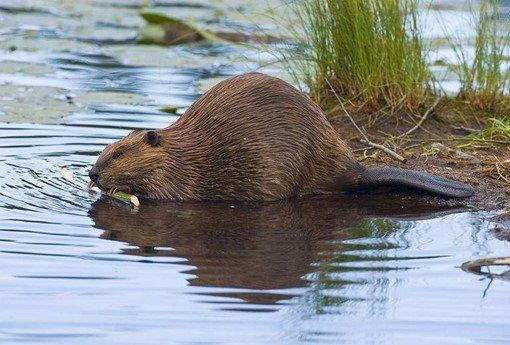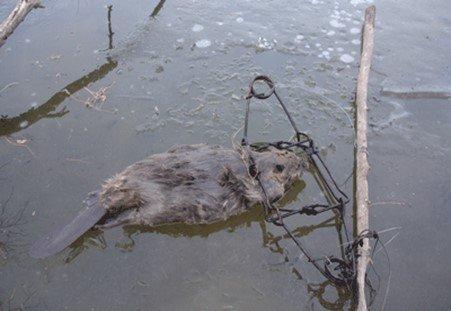Spring 2018
Stanley Petrowski
No Water – No Life
It is obvious that water is one of the most critically important elements of creation. It is not so obvious that it is one of the most threatened elements that restoration ecologists and enthusiasts see on the horizon. Throughout the Pacific Northwest, the challenges facing our culture and the natural world focus intensely on the abundance, availability, and quality of water. We are seeing a steady and steep decline of hydrological processes, water utilization and ecosystem functions that support cool clean water.
Beaver to the Rescue
 Umpqua Watersheds has been a longtime advocate for re-establishing beaver ecology in wetland and ecosystem recovery. There is overwhelming scientific evidence that beaver are a linchpin species that are important for a diverse ecosystem to support wildlife and hydrological processes. UW has a library full of research showing the benefits of beaver to the entire web of life. They are nature’s wetland engineers, purifying and maintaining the water supply. Recently, there have been studies quantifying the carbon and nitrogen stored in beaver ponds. Other studies have clearly shown that the shortage of water with high water temperatures in our watersheds is directly related to the extirpation of the beaver. They were a functional part of ancient ecosystems long before European trappers removed them.
Umpqua Watersheds has been a longtime advocate for re-establishing beaver ecology in wetland and ecosystem recovery. There is overwhelming scientific evidence that beaver are a linchpin species that are important for a diverse ecosystem to support wildlife and hydrological processes. UW has a library full of research showing the benefits of beaver to the entire web of life. They are nature’s wetland engineers, purifying and maintaining the water supply. Recently, there have been studies quantifying the carbon and nitrogen stored in beaver ponds. Other studies have clearly shown that the shortage of water with high water temperatures in our watersheds is directly related to the extirpation of the beaver. They were a functional part of ancient ecosystems long before European trappers removed them.
Beaver – Are They Or Are They Not, OK?
Federal agencies such as NOAA’s National Marine Fisheries Service have a long history of data showing the importance of beaver in the recovery of threatened and endangered fish. Without the influence of beavers on our waterways, recovery of Coho salmon and other salmonids and aquatic species will likely not happen. The US Fish and Wildlife Service has been discussing the real value of beaver ecology to the public. It is well known that the ESA listed Spotted Frog is in serious jeopardy because beaver have been removed from their native watersheds.
So What’s The Problem?
At times, government agencies can have conflicting ideas of how to approach wildlife conservation and restoration. As a society, we tend to ignore wildlife until an ecosystem collapse forces us to confront the damage done. Recently, I have collaborated to challenge the characterization of beavers by the federal government and the public. APHIS (Animal and Plant Health Inspection Service-the Federal agency charged with killing “nuisance” wildlife) has been funded for many years to kill beaver. Schools and libraries are closing in our community while tens of thousands of Oregon Secure Rural Schools Act Title III dollars are spent needlessly trapping wildlife in our region including our ecosystem engineers, the beaver. We are undermining aquatic hydrological processes by doing so. Government scientists have proven beaver ecosystem services need to be restored yet tax dollars are spent trapping and removing beaver. Much of this is a direct result of conflict between those agencies that are charged protecting the natural world and agencies charged with maximizing the economic output of the agriculture industry.
UW, in cooperation with a legal team from several conservation groups, has recently filed a notice of intent to sue APHIS for not consulted with appropriate agencies under Section 7 of the Endangered Species Act. Section 7, called “Interagency Cooperation,” must be utilized when the action of an agency impacts a species under the ESA. Those agencies responsible for protecting ESA listed species must decide what the threatening agency can or cannot do. APHIS has been killing beaver without consultation for some time. As a result of the intent to sue, APHIS has agreed to cease killing beaver in most cases until the process of consultation is completed. That’s good news for now. Why is this important keystone species killed in the first place? They are responsible for damage to private property by gnawing ornamental and fruit trees, blocking culverts, and flooding roads. But, flooding is an important part of ecosystem recovery by providing riparian connectivity. There are solutions without resorting to the lethal removal of beaver. These short-term solutions come with long-term negative impacts. Pressure from the agricultural industry is influencing policy toward beavers at the federal level, in particular, APHIS.
What Next?
 Historically, beavers were designated “fur bearers”. To facilitate the elimination of beaver, the State of Oregon has re-designated them a “nuisance” “predator”! Beaver were also designated “rodents” to characterize them as useless animals standing in the way of progress. UW and regional conservation institution partners are supporting international efforts to raise awareness of virtues of this species through dissemination of scientific literature and presentations at conferences and workshops. We cannot restore our watersheds without beaver. Our task is to declare them as a focal keystone species by redefining their role and function in the restoration of hydrologic ecosystems. Our colleagues, particularly in Eastern Europe, are way ahead of us in working to restore the beaver ecosystem. Poland, for instance, has repopulated beaver in its entire national aquatic ecosystem.
Historically, beavers were designated “fur bearers”. To facilitate the elimination of beaver, the State of Oregon has re-designated them a “nuisance” “predator”! Beaver were also designated “rodents” to characterize them as useless animals standing in the way of progress. UW and regional conservation institution partners are supporting international efforts to raise awareness of virtues of this species through dissemination of scientific literature and presentations at conferences and workshops. We cannot restore our watersheds without beaver. Our task is to declare them as a focal keystone species by redefining their role and function in the restoration of hydrologic ecosystems. Our colleagues, particularly in Eastern Europe, are way ahead of us in working to restore the beaver ecosystem. Poland, for instance, has repopulated beaver in its entire national aquatic ecosystem.
Oregon-The Beaver State
We are the beaver State; we have a golden beaver on our flag. Gold coins (specie) minted in Oregon during the early and mid-1800’s were called “beaver money”. They had the same value as beaver skins. In the pressure of daily life most of the general public hasn’t realized that beaver are being killed or their value. A state survey sent some shocking results to many public servants. Here’s a link to the survey. http://www.dfw.state.or.us/wildlife/living_with/docs/ODFW and OWEB – Landowner Beaver Project – Final Report – Needham and Morzillo.pdf The vast majority of Oregonians want beaver back in the ecosystem.
We need to pressure the USFWS and NMFS to support beaver protection and restoration. They have the science, but politics is getting in the way. Let’s not let sound science and compassion toward the natural world be smothered by a crippling world view that sees everything through the lens of short-term economic efficiency. Support Umpqua Watersheds’ effort to bring the beaver back. Let us hear from you.


